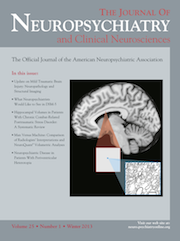Schizophrenia Presenting With Koro-Like Symptoms
To the Editor: Koro is a culture-bound syndrome, first identified in Southeast Asia. It is characterized by the belief that the patient’s penis is shrinking or retracting into the abdomen, and its eventual disappearance will result in the patient’s death.1
In contemporary Western societies, ideas of genital disappearance are relatively rare and not culturally endorsed.2 These Koro-like symptoms (KLS) generally occur as isolated cases and present as a comorbidity of psychiatric disorders or cerebral lesions.3
We present a patient with schizophrenia whose initial psychotic episode might be diagnosed as Koro syndrome.
Case Report
A 41-year-old Caucasian single man was admitted to the emergency room with extreme anxiety and complaints of severe insomnia for the last 3 days. The patient had no previous psychiatric history except for a 15-year history of cannabis abuse and 3-year history of heroin dependence, but denied any illegal drug usage in the last 2 years. There was no history of sexual trauma, and the patient appeared to have a history of adequate sexual adjustment.
Psychiatric examination revealed the following positive findings: intense anxiety secondary to a fear that his penis was getting smaller and retracting into his body, and third-person auditory hallucinations. The results of physical examination, routine laboratory tests (including toxicology screening), brain computed tomography (CT) scan, and electroencephalogram (EEG) were normal.
The patient was treated with olanzapine (15 mg/day) and diazepam (15 mg/day). Two weeks after the therapy, the patient no longer thought that his penis was getting smaller and retracting into his body. After 3 weeks, the patient was discharged with improvement of psychotic symptoms. Six-month follow-up revealed no exacerbation of psychosis or Koro manifestations. However, the patient presented negative symptoms, such as social withdrawal, loss of drive and interests, and a blunting of affect.
Discussion
Our patient presented as a new case of onset- KLS without psychiatric history, with the exception of previous cannabis and heroin abuse. Sporadic Koro has been reported to occur among patients with cannabis abuse and heroin withdrawal.3,4 Despite that, the toxicology screening was negative, and our patient denied any drug abuse for the last 2 years. Furthermore, other organic mental illnesses were investigated: physical examination, routine laboratory tests, CT scan, and EEG revealed no signs of an organic disorder.
The treatment of sporadic Koro depends on its etiology. The antipsychotic treatment led to control of the positive symptoms and achievement of a complete remission of the KLS presenting on the first acute schizophrenic episode. However, the patient presented some negative symptoms of schizophrenia several months later.
Abnormalities of body perception are a possible feature in schizophrenia. Similar to the Koro syndrome, many disorders of body scheme have both neurological and psychiatric aspects, which suggest that a coherent neural representation of the body is a key element of self-consciousness. Furthermore, abnormalities of body schema can lead to an altered body image.5
KLS may possibly exist more frequently than reported in schizophrenia, because patients may be reluctant to report their symptoms because of guilt and shame. The brain mechanisms contributing to the subjective experience of penis retraction still remain to be identified. Further research on this subject could contribute to a better understanding of the development of KLS related to schizophrenia.
1 : Koro epidemic in northeast India. Aust N Z J Psychiatry 1985; 19:433–438Crossref, Medline, Google Scholar
2 : Koro-like symptom in a non-Chinese subject. Br J Psychiatry 1984; 145:331–334Crossref, Medline, Google Scholar
3 : Le syndrome de Koro. Ann Med Psychol 2007; 165:147–153; http://www.em-consulte.com/article/60764/article/le-syndrome-de-koroGoogle Scholar
4 : Koro in heroin withdrawal. J Psychoactive Drugs 1993; 25:257–258Crossref, Medline, Google Scholar
5 : Disorders of body scheme, in Higher-Order Motor Disorders: From Neuroanatomy and Neurobiology to Clinical Neurology. Edited by Freund HJeannerod MHallett M. Oxford, UK, Oxford University Press, 2005, pp 377–391Google Scholar



